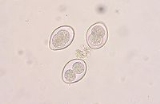
Coccidia
Overview
Coccidia is a subclass
of microscopic, spore-forming, single-celled obligate parasite
s belonging to the apicomplexa
n class Conoidasida
. Coccidian parasites infect the intestinal tracts of animals, and are the largest group of apicomplexa
n protozoa.
Coccidia are obligate
, intracellular
parasites, which means that they must live and reproduce within an animal cell.
They form a subclass within the Conoidasida and are divided into four orders distinguished by the presence or absence of various asexual and sexual stages.
Order Adelidea Ledger 1911
Order Agamococcidiida Levine 1979
Order Coccidiida Leukart 1879
Order Protococcidiida Cheissin 1956
The order Coccidia is divided into two groups.
Class (biology)
In biological classification, class is* a taxonomic rank. Other well-known ranks are life, domain, kingdom, phylum, order, family, genus, and species, with class fitting between phylum and order...
of microscopic, spore-forming, single-celled obligate parasite
Obligate parasite
An obligate parasite is a parasitic organism that cannot complete its life cycle without dependence on its host.-See also:*Obligate intracellular parasite*Parasitism*Parasitic plant*Facultative parasite...
s belonging to the apicomplexa
Apicomplexa
The Apicomplexa are a large group of protists, most of which possess a unique organelle called apicoplast and an apical complex structure involved in penetrating a host's cell. They are unicellular, spore-forming, and exclusively parasites of animals. Motile structures such as flagella or...
n class Conoidasida
Conoidasida
Conoidasida is a class of protists.The class was defined in 1988 by Levine and contains two subclasses - the coccidia and the gregarines. All members of this class have a complete, hollow, truncated conoid...
. Coccidian parasites infect the intestinal tracts of animals, and are the largest group of apicomplexa
Apicomplexa
The Apicomplexa are a large group of protists, most of which possess a unique organelle called apicoplast and an apical complex structure involved in penetrating a host's cell. They are unicellular, spore-forming, and exclusively parasites of animals. Motile structures such as flagella or...
n protozoa.
Coccidia are obligate
Obligate parasite
An obligate parasite is a parasitic organism that cannot complete its life cycle without dependence on its host.-See also:*Obligate intracellular parasite*Parasitism*Parasitic plant*Facultative parasite...
, intracellular
Intracellular
Not to be confused with intercellular, meaning "between cells".In cell biology, molecular biology and related fields, the word intracellular means "inside the cell".It is used in contrast to extracellular...
parasites, which means that they must live and reproduce within an animal cell.
They form a subclass within the Conoidasida and are divided into four orders distinguished by the presence or absence of various asexual and sexual stages.
Order Adelidea Ledger 1911
Order Agamococcidiida Levine 1979
Order Coccidiida Leukart 1879
Order Protococcidiida Cheissin 1956
The order Coccidia is divided into two groups.
Unanswered Questions

